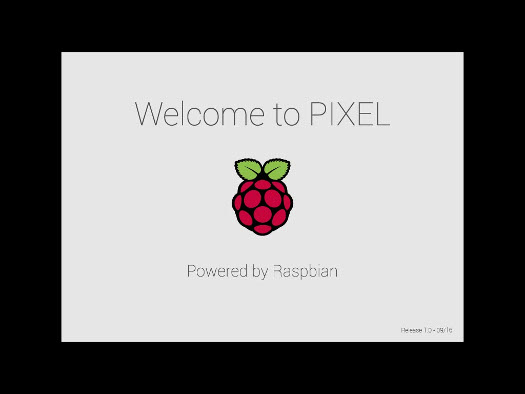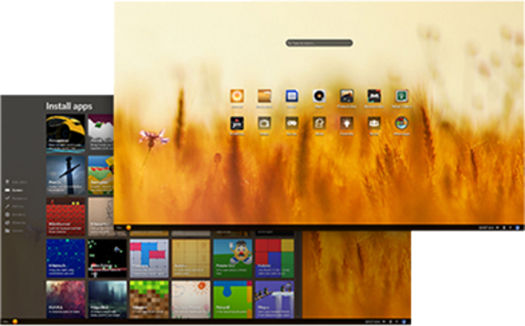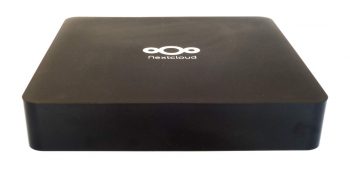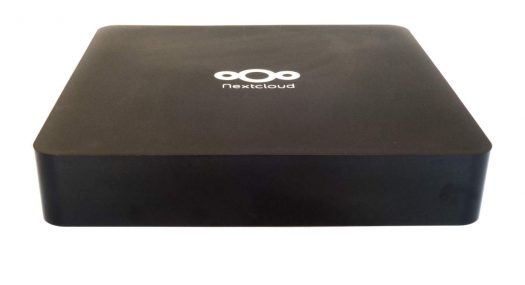We find it very refreshing, watching these two young people sitting around talking about Linux distros as if it’s the most natural thing in the…
Posts published in “Distros”
Raspbian, the Raspberry Pi’s most well known distro, has an exciting new look and feel with Pixel.
The Raspberry Pi Report
A couple of weeks ago, the Raspberry Pi Foundation announced they had tuned up the look and feel of Raspbian. The new buzzword created to help bring about the message that the UI had changed was dubbed “Pixel,” which stands for “Pi Improved Xwindows Environment, Lightweight.” While I’m not completely sold on trying to make Pixel stand for something, what I am completely sold on is what it has brought to the table for the Raspberry Pi. With Pixel, Raspbian has the look and feel of an elegant OS and I’m beyond happy that they have put this together for the Raspberry Pi community. I’ve tried out Pixel for the past week and here’s my take to date.

In addition to hosting a Raspberry Pi meetup in Washington D.C., Isaac Carter is a co-host on mintCast. He’s also a software engineer who enjoys working with Java, JavaScript, and GNU/Linux. When he’s not coding, you can find him reading on any number of subjects or on the golf course.
Also included: Judge seems to make software patents illegal, Mageia mourns a contributor, Yakkety Yak frozen, KDE’s new release, and getting ready for All Things Open.
FOSS Week in Review
When I wrote last week’s wrap, Hurricane Matthew seemed to be on a direct path for my office. Now it appears that long before it hits my state it’s going to take a sharp turn to the right and head back out to sea. That’s the good news. Unfortunately, in getting to where it is today, this storm has so far killed nearly 1,000 people that we know of so far, and has made thousands, perhaps tens of thousands, homeless. That’s bad news indeed.
This week’s free tech news was a little more fun…
 Digital Homicide commits suicide: In a story that’s been brewing for a while now, it seems that game company Digital Homicide was given enough rope to…well, you know. It seems that the publisher had gotten in the habit of suing any Steam user who dared to post a bad review about one of its games, and actually subpoenaed Valve for the identities of 100 anonymous users who had made statements about the company. This, in turn and understandably, pissed a lot of users off, which led to Valve removing all games from Steam.
Digital Homicide commits suicide: In a story that’s been brewing for a while now, it seems that game company Digital Homicide was given enough rope to…well, you know. It seems that the publisher had gotten in the habit of suing any Steam user who dared to post a bad review about one of its games, and actually subpoenaed Valve for the identities of 100 anonymous users who had made statements about the company. This, in turn and understandably, pissed a lot of users off, which led to Valve removing all games from Steam.
Christine Hall has been a journalist since 1971. In 2001, she began writing a weekly consumer computer column and started covering Linux and FOSS in 2002 after making the switch to GNU/Linux. Follow her on Twitter: @BrideOfLinux
Users of Fedora 24 might want to put any update plans on hold until this bug issue is resolved.
Breaking News
A warning was published Tuesday by Adam Williamson on the Fedora website against running dnf update in a graphical environment in Fedora 24. The warning was issued after numerous users began reporting “duplicated packages” and “kernel updates not working” error messages after running the update.
Also included: Debian developer Kristoffer H. Rose passes, two new distro releases, Apricity OS adds 32-bit, Canonical gets Kubernetes, Snapcraft gets a new release and getting ready for All Things Open.
FOSS Week in Review
Yikes! Remember last weekend when I was so happy that the dog days of summer had left us behind to be replaced with more comfortable autumnal temps? While that’s true, with nights getting chilly enough that I’m going to have to dig out my comforter, I forgot that this time of year is also the peak of the hurricane season. This means that for much of the next week I’m keeping a wary eye to the south, where Hurricane Matthew may or may not have my part of the Carolinas directly in its sights. It looks as if we’ll know better about what it has in mind by Tuesday afternoon.
 Tux Paint needs a Mac maintainer: Everybody’s favorite FOSS paint tool is having a little trouble running on Macs these days — specifically on OS X 10.11 El Capitan. Designed with kids in mind, the app is used extensively at schools, with many school systems now upgrading to El Capitan, which was released a year ago.
Tux Paint needs a Mac maintainer: Everybody’s favorite FOSS paint tool is having a little trouble running on Macs these days — specifically on OS X 10.11 El Capitan. Designed with kids in mind, the app is used extensively at schools, with many school systems now upgrading to El Capitan, which was released a year ago.
Christine Hall has been a journalist since 1971. In 2001, she began writing a weekly consumer computer column and started covering Linux and FOSS in 2002 after making the switch to GNU/Linux. Follow her on Twitter: @BrideOfLinux
This Ubuntu-based Linux distribution provides the Internet for those who don’t have 24×7 access to the net.
In the West, we take the Internet for granted. Oh, we may grumble about a slow connection, but that’s a first-world problem. For many, however, the Internet is a “maybe” thing. For those users, Endless’s Endless OS 3, may be just what they need.

This Ubuntu Linux-based operating system is designed for use with the “Asynchronous Internet.”
Steven J. Vaughan-Nichols writes about Linux and FOSS for ZDNet and other publications.
Also included: Yahoo’s big hack, Garrett on Lenovo, new Audacious and GNOME, and Ubuntu get’s ready for Yakkety Yak.
FOSS Week in Review
I spent time this week terminating a Yahoo account I’ve had since way back in the last century. For years, the My Yahoo page was my “home” page whenever I fired-up the old dial-up to go online, but over time the portal (remember portals?) became less and less relevant and I found my visits to Yahoo becoming less and less frequent. By the time I closed the account, prompted by news of a massive hack involving 500 million accounts going back to 2014, I hadn’t visited my Yahoo page in well over a year. RIP Yahoo. It was nice knowing you.
Christine Hall has been a journalist since 1971. In 2001, she began writing a weekly consumer computer column and started covering Linux and FOSS in 2002 after making the switch to GNU/Linux. Follow her on Twitter: @BrideOfLinux
Also included: Libreboot leaves GNU, municipal broadband law proposed, Linux’s second 25th birthday, a new distro release, Vim and Emacs both get upgrades, Google’s hack challenge and Oracle can’t catch a break.
FOSS Week in Review
Yesterday I got a look at some decidedly old tech: Rope beds, pewter being made by hand, ceramic wood burning stoves, a bit of blacksmithing — all at Bethabara, which is a preserved 18th century village that had been established by German Moravians, who were the first settlers around these parts. Fascinating. The event was the annual Apple Fest, with plenty of local orchards offering every variety of apple imaginable, as well as about any kind of food prepared with apples.

Christine Hall has been a journalist since 1971. In 2001, she began writing a weekly consumer computer column and started covering Linux and FOSS in 2002 after making the switch to GNU/Linux. Follow her on Twitter: @BrideOfLinux
Also included: Remembering Vernon Adams, Red Hat vs. VMware, a new distro release, openSUSE Leap and ransomware that deletes files.
FOSS Week in Review
The summer of ’16 is all but over. Good riddance. Here in my piece of the woods we’ve seen all of the 90 plus days with high humidity I can take. Time to get out the long sleeves and sweaters.
It’s also time to look at this week’s FOSS news.
Christine Hall has been a journalist since 1971. In 2001, she began writing a weekly consumer computer column and started covering Linux and FOSS in 2002 after making the switch to GNU/Linux. Follow her on Twitter: @BrideOfLinux









